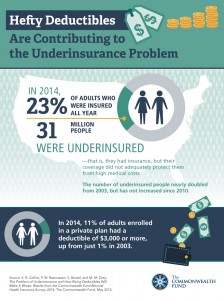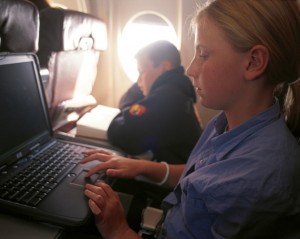A new report of the Commonwealth Fund finds that last year, 31 million Americans with health insurance had inadequate coverage or were underinsured. People are considered underinsured if they have had health insurance for a full year, but have high deductibles or out-of-pocket expenses relative to their income. The report found that the consequences of being underinsured are significant. Half (51%) of those who were underinsured had problems paying medical bills or were paying down medical debt over time. More than one-third (38%) were struggling to pay or could not pay their medical bills and one-third (34%) had long-term medical debt. More than one-fifth (23%) were contacted by a collections agency concerning unpaid medical bills or said that had to make lifestyle changes in order to pay their medical bills (22%). Following on the JP Morgan Chase study, cited in a recent blog entry, about the difficulties people are having with volatile income and unpredictable expenses, this study provides insight into the financial stress many Americans are suffering. Is there a way you can reduce the burden on your employees, such as through the use of tax-advantaged Health Savings Accounts? High deductibles and co-payments may discourage over-utilization, but it is counter-productive to have people deferring necessary care because of the out-of-pocket costs only to have a more serious, and more expensive medical problem later. In Prepare for the Worst, Plan for the Best: Disaster Preparedness and Recovery for Small Businesses, I recommended that small business consider reducing their commercial insurance premiums by selecting higher deductibles (and saving and budgeting for those deductibles). But for medical insurance, I favor the opposite approach.
Archive for the ‘Community’ Category
Rising Insurance Deductibles Contribute to Increase in Rates of Underinsured People
Thursday, May 21st, 2015Happy Labor Day
Tuesday, September 7th, 2010Labor Day marks the end of the summer season and the beginning of back to school excitement. It also begins, we hope, more intense commercial activity, as business slows in July and August when decision makers are on vacation. The weather in New York couldn’t be better for the three-day weekend: sunny and mild with temperatures in the 70s. As I reflect on my summer fun, my fondest memories were the concerts in the parks of the New York Philharmonic. I took this photograph of the concert I attended with a group of friends on July 13. The Philharmonic presented a great program with works from Tchaikovsky, Ravel, Wagner and even the dances from West Side Story. Unfortunately, the fireworks display was canceled when rain was forecast. The rain didn’t materialize and the concert was presented in full. Missing the fireworks was disappointing, but no matter. I sat with friends on blankets and lawn chairs on the grass of Central Park enjoying great music, great friendship and a picnic. Now with the heat breaking, we can look forward to sailing on the Hudson River this fall. I wish you all a relaxing holiday weekend to recharge as we prepare for the busy months of autumn.
Small Businesses Need to Contain the Spread of Swine Flu
Sunday, April 26th, 2009The U.S. has declared a public health emergency to facilitate the shipment of approximately 12 million doses of flu medications from a federal stockpile to states in case they may be eventually needed. Thankfully, that does not yet appear necessary. As Mexico has reported 86 people died as a result of the swine flu, possible swine flu cases have surfaced from as far away as New Zealand. Canada has confirmed six cases of swine flu and the U.S. confirmed 20 cases in 5 states, all with mild symptoms, who are recovering easily. In both the U.S. and Canada, the confirmed cases appear to have originated with students who had recently visited Mexico.
As the cases of swine flu reported outside of Mexico appear to be mild and have not resulted in any fatalities, public health officials do not consider the flu to be a pandemic threat. Nevertheless, the public should take precautions to contain the spread of the flu virus. I had the opportunity to discuss this topic, in the context of the SARS threat, when working in Beijing not long ago. Many factories in mainland China experience significant workforce absenteeism owing to SARS-related illnesses. Working remotely is not an option for assembly line workers, but for other factory employees, such as office staff, it might be. Preparing for remote operations, or telecommuting from home, is a precaution that you should take in dealing with less severe threats. If employees don’t have to come to work, where they will be in close contact with other, possibly contagious people, in public transport or in the work place, allowing them to work from home may slow the spread of the illness. Some employees may have to work from home if they are caring for sick relatives.
I wish I had done that this past week. I spent the week in a newsroom where people work in very close proximity to one another. All week long, I had people coughing around me, but I felt great. Of course, this being the ideal weekend for outdoor activities with beautiful weather, I became ill on Friday within a few hours of coming home. I spent the weekend in bed, drinking lots of fluids and taking over-the-counter remedies. I think I have something more mundane than the flu, but it was unpleasant. I should take my own advice. For more information on how small businesses may prepare for public health risks, please see the attached article from New York Times Small Business feature. Reporter Patricia Olsen interviewed me in connection with a SARS-type threat, but the lessons remain applicable.
Survey Reveals That Families Are At Risk
Sunday, September 28th, 2008The Mailman School of Public Health of Columbia University recently released the results of an annual study on disaster preparedness that it has been conducting since the 9/11 terrorist attacks. To download and read the report, click here. The study didn’t reveal any major surprises: most Americans are not prepared for a major emergency and most parents are not aware of the disaster plans their children’s schools have in place. The survey question I found most interesting was “Which statement best characterizes what you think might happen in a disaster situation?” 57% of respondents answered that “You will work on your own to protect yourself and your family” and 13% answered “You will wait for help to arrive”. If 57% of the population accepts that you must work on your own to protect yourself and your family, then you would expect that at least 57% of the respondents would indicate that they have disaster plans in place for their families, but the number was far lower than that. It appears that people know what they have to do, but they are not all doing it. As small business owners, we can change this. Encourage your employees to put in place disaster plans for their families using the same methodology we are using for our small businesses. This will not only help your employees and their families, but it will help to secure their “buy-in” for your business disaster plan, when everyone realizes the benefits.
Meet Me at the Forbes Small Business Exchange
Friday, September 26th, 2008I have joined the Small Business Exchange of Forbes.com as the expert on small business disaster preparedness and recovery, where I am available to answer questions from members of the Exchange. I have just answered my first three questions and look forward to helping as many small business owners as I can. The Small Business Exchange is an online community for small businesses and I have found it to be a valuable tool for meeting potential customers and sharing expertise. I am an enthusiatic reader of Forbes and a long-term subscriber to the magazine, so I hope you will join me. Other members of the Exchange offer expertise on bankruptcy issues, credit card systems, financial strategies and other important needs for small businesses. Of course, you can also communicate with me through this blog as well!
Two Thoughts From Pennsylvania
Thursday, September 11th, 2008I learned a great deal from my participation in the “Building a Disaster-Resilient Small Business” workshop series of the Pennsylvania Small Business Development Center’s Environmental Management Assistance Program. The series consisted of three, three hour-workshops hosted by the Small Business Development Centers of Penn State University at State College, Bucknell University at Lewisburg and Duquesne University in Cranberry Township. T. David Filson and I facilitated each of the three workshops. Mr. Filson coordinates the emergency preparedness and response communications within the Penn State Cooperative Extension. Two issues, in particular, came up during the discussion that I want to share with you. The first concerns fire safety. Dave Filson spoke of how he had participated in group safety training with the local fire department in which each person had to demonstrate that he could put out a fire using the fire extinguisher. The fire fighter who taught the program would carefully start a fire in a controlled setting, giving the chance to learn in a safe environment.
The second issue that arose concerned the unique needs of union workplaces and work rules as set out in collective bargaining contracts. For those small businesses that work with unionized employees, you need to have clarity about what their work responsibilities will be, within the framework of their contract, during a disaster recovery operation. This is particularly important as the union work rules may limit the flexibility of the response to disaster-related needs that you cannot always anticipate in advance.
I thought I would post these comments so that workshop participants in other parts of the country could have the benefit of our discussions. I very much look forward to returning to Pennsylvania. I had wanted to visit a bit, but driving the entire width of Pennsylvania on the turnpike left me little time!



